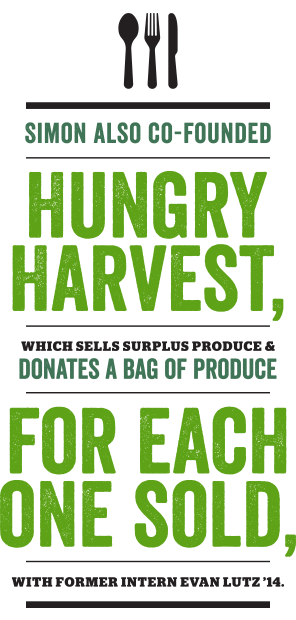- March 31, 2015
- By Karen Shih ’09
A homeless man who came to live with Ben Simon’s family for two years gave the then-teenager his first close encounter with hunger and poverty.
The man worked full-time at a local grocery store but couldn’t afford rent after a leg injury racked up nearly $100,000 in medical bills.
“I got to see that even if you work really hard, there can be so many disadvantages to you trying to climb out of poverty,” says Simon ’14.
That’s why, in 2011, Simon rounded up some friends to start collecting unserved food from the dining halls and sports concessions to donate to local food pantries.
“We thought it was so crazy that UMD was throwing away all that food…when there was such a huge need,” he says.
His Food Recovery Network (FRN) has expanded to 127 colleges in 32 states and has collected more than 650,000 pounds of food over the last four years, earning Simon a spot on Forbes’ 2015 list of “30 Under 30” Social Entrepreneurs.
He’s always pitched in, from collecting canned goods in elementary school to taking part in walkathons with his parents. During high school, he led 50 students to lobby the Montgomery County Council and the Maryland National Capital Park and Planning Commission to divest from companies that funded genocide in Darfur. They also staged a die-in with 200 students in downtown Silver Spring to get their message across.
“I view genocide and other issues like climate change and food insecurity as intertwined,” Simon says. “A lot of injustices… are rooted in the same problems of poverty and conflict over resources.”
In 2012, FRN entered—and won—UMD’s inaugural Do Good Challenge at the urging of Professor Bob Grimm, director of the Center for Philanthropy and Nonprofit Leadership in the School of Public Policy.
“Ben exhibited to me that he had a great idea and was willing to think differently about how to achieve his goals,” says Grimm, who serves on its board of directors. “He’s someone who can inspire other students and young people to take up these issues and get people to think about food recovery like we think about recycling.”
Grimm helped FRN form its national organization, with Simon and students from the first four schools to start chapters as co-founders, and gain nonprofit status. FRN received a $300,000 Sodexo Foundation grant in 2013 to hire their first five paid employees, and today, 12 work in an office in College Park. They include original UMD co-founders Mia Zavalij ’14 and Cam Pascual ’15, as well as Alex Kreffetz ’14.
FRN’s rise has drawn international coverage: MSNBC’s Melissa Harris-Perry named Simon “Foot Soldier of the Week” in January 2013, and outlets as varied as The Washington Post, Russia Today and theSkimm have all featured the organization.
It’s not always easy to convince a school’s dining services to approve requests to donate the unserved food, because many don’t understand that federal law protects them from lawsuits. FRN has partnered with all of the country’s major food-service companies, Bon Appetit, Sodexo, Chartwells and Aramark, to help prepare dining managers so they can be more receptive to working with FRN chapters.
FRN also plans to work with K–12 schools, teaching students about food waste and how to avoid it. Last year, FRN created a program to recognize companies as “Food Recovery Certified,” and it’s taken off, as places like the Starbucks headquarters, the Bill & Melinda Gates Foundation and Nordstrom have all earned the distinction.
“As Martin Luther King said, ‘Injustice anywhere is a threat to justice everywhere,’” says Simon. “We’re on track to make food recovery the norm… not the exception.”
Tags
Student Experience